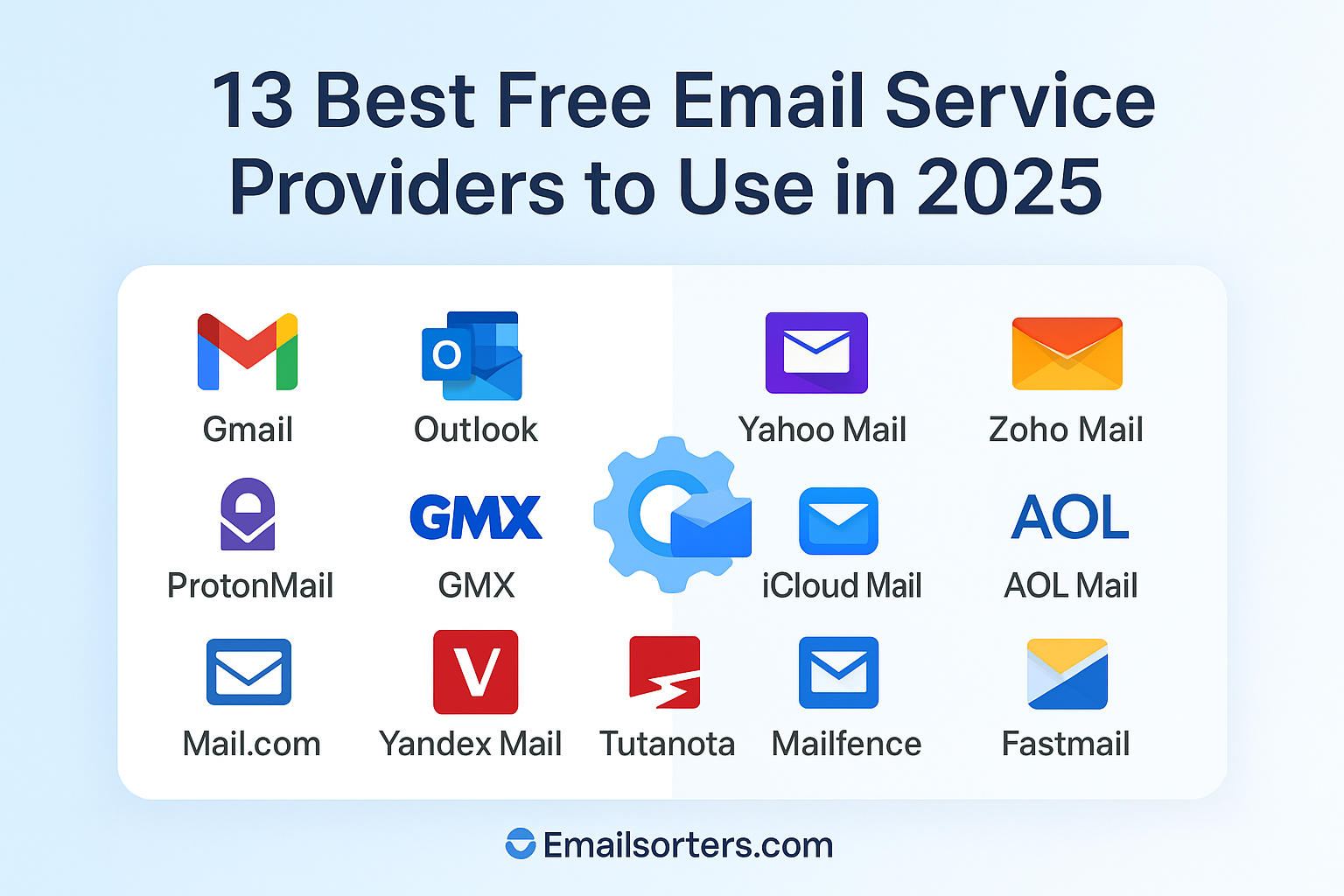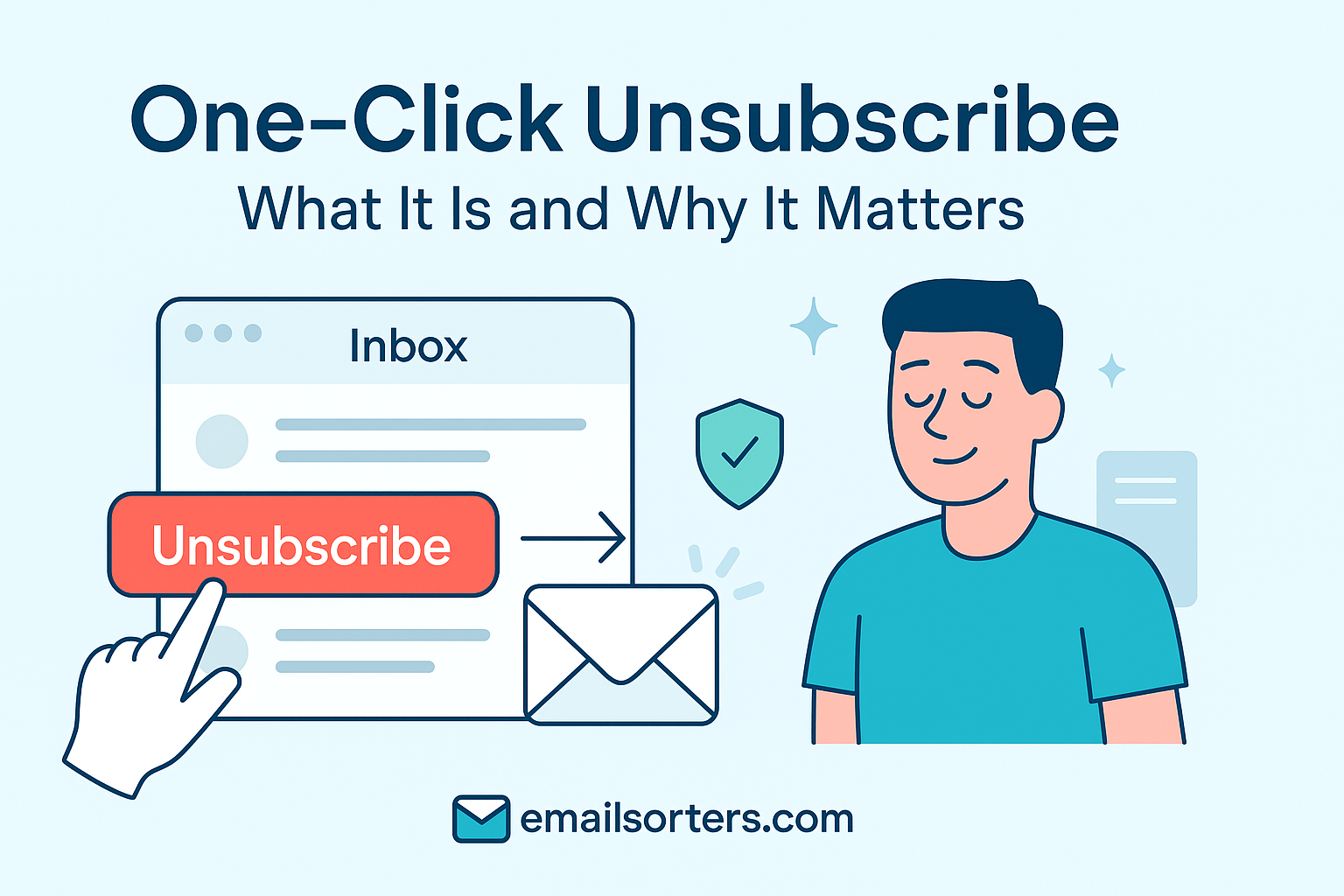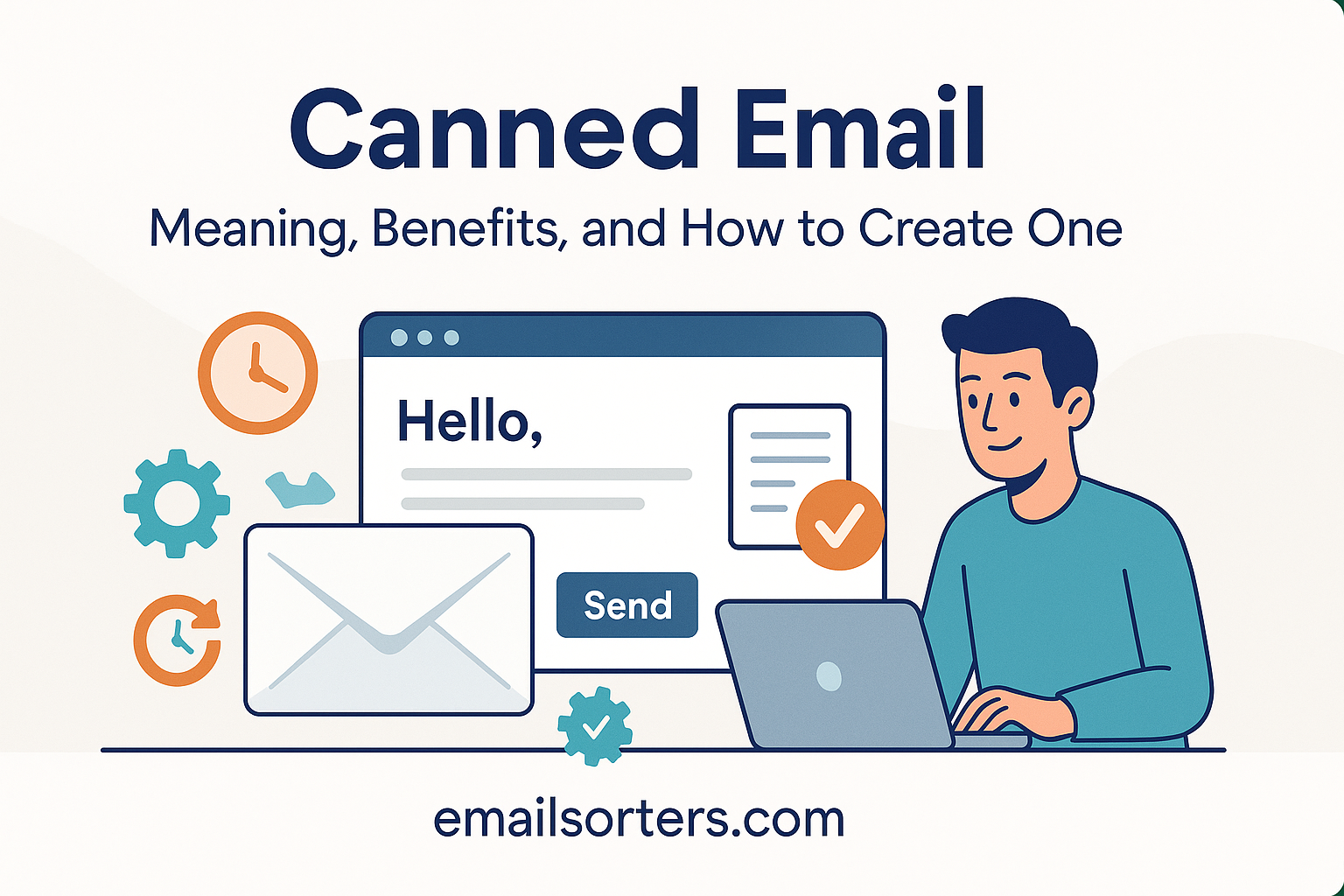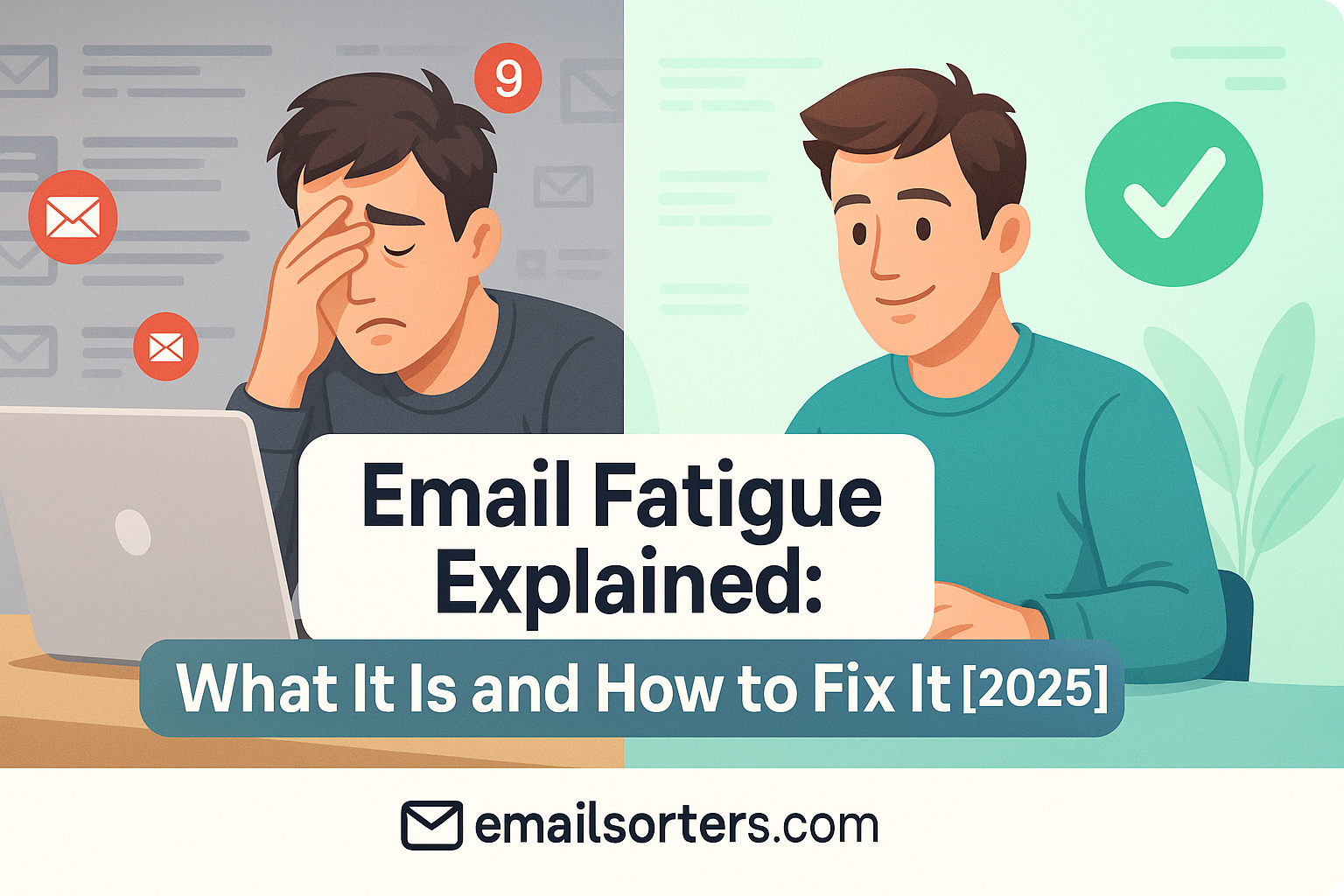Free Email Service Providers are essential tools for communication in 2025. From personal messages to professional work, email remains a vital part of daily life.
Choosing the right free email service provider can boost your productivity, protect your data, and simplify your workflow.
This guide reviews 13 of the best free email service providers available this year. You’ll discover their features, security options, and how they fit different needs. Whether you want strong privacy, large storage, or smooth integration with other tools, there is a perfect choice for you here.
Why Choosing the Right Free Email Service Providers
A poor email provider can expose you to risks like data breaches, spam overload, or limited functionality, disrupting your communication. Modern free email services offer robust features like encryption, ample storage, and app integration, which can boost efficiency for work, study, or personal use. The right provider ensures your emails are secure, organized, and accessible, saving you time and reducing stress.
Quick Comparison Table: Top Free Email Services at a Glance
| Provider | Best for | Storage Offered | Notable Features |
| Gmail | Google Ecosystem Integration | 15 GB | Private messaging, spam protection, Gemini AI |
| Outlook | Microsoft Users | 15 GB | Clean interface, Microsoft 365 integration |
| Proton Mail | End-to-End Encryption | 1 GB (free) | Ad-free, open source, PhishGuard |
| Tuta | Privacy-First Communication | 1 GB (free) | Zero-knowledge, post-quantum cryptography |
| Yahoo Mail | Generous Storage | 1 TB | AI-powered summaries, easy unsubscribe |
| Zoho Mail | Custom Domain Support | 5 GB (free) | Streams for collaboration, admin console |
| iCloud Mail | Apple Device Owners | 5 GB (free) | Seamless Apple integration, spam protection |
| Mail.com | Unique Domain Choices | 65 GB | 100+ domains, cloud storage, virus protection |
| Mailfence | Secure Collaboration | 1 GB (free) | OpenPGP encryption, digital signatures |
| Neo | Solo Entrepreneurs | 15 GB (Starter) | Read receipts, AI email writer, appointment booking |
| AOL Mail | Simplicity | 1 TB | Travel/photo views, themes, multi-language |
| GMX | File Sharing Support | Almost unlimited | Cloud storage, online office, mail collector |
| StartMail | Private Business Use | 20 GB (personal) | No ads, unlimited aliases, PGP encryption |
The 13 Best Free Email Providers (Reviewed and Ranked)
Many email services advertise themselves as “free,” but not all deliver on that promise. Some only offer limited-time trials, while others restrict essential features unless you pay. To help you find the best truly free email options, we tested dozens of providers and narrowed them down to the top 13 that offer fully functional, no-cost email accounts, no strings attached.
Here are the best free email services available today:
- Gmail – Best Overall Free Email Service
Reliable, fast, and packed with features, Gmail remains the gold standard for personal and professional use. - Outlook – Best for a Clean, Focused Inbox
With a sleek interface and smart inbox tools, Outlook is perfect for staying organized. - Proton Mail – Best for Privacy and Security
End-to-end encryption and a strong stance on user privacy make this a top choice for secure communication. - Tuta – Best for an Ad-Free Experience
Formerly known as Tutanota, Tuta offers a clean, private inbox with no ads or tracking. - Yahoo Mail – Best for Large Storage
With 1TB of free storage, Yahoo Mail is ideal for users who keep everything in their inbox. - Zoho Mail – Best for Business Users
A great choice for entrepreneurs and small teams, Zoho offers productivity features and domain-based addresses. - iCloud Mail – Best for Apple Device Users
Seamlessly integrated into Apple’s ecosystem, iCloud Mail works great across iPhone, iPad, and Mac. - Mail.com – Best for Custom Domains and Large Attachments
Choose from dozens of domain names and send files up to 50MB for free. - Mailfence – Best for Secure, Encrypted Communication
A strong focus on data integrity and digital signatures makes Mailfence ideal for sensitive messaging. - Neo – Best for Built-in AI Tools
Neo brings smart features to your inbox, helping you write better emails and stay on top of tasks. - AOL Mail – Best for Long-Term Email Storage
A classic with generous storage and minimal clutter—great for those who rarely delete. - GMX – Best for Multiple Email Aliases
GMX lets you manage several email aliases from one inbox, with solid storage and spam filtering. - StartMail – Best for Private, Paid Upgrade Path
While the free version is limited, StartMail offers a privacy-first email experience that can grow with you.
Gmail – Best for Google Ecosystem Integration
Gmail, offered by Google, is a leading email service with 15 GB of free storage shared across Google services like Drive and Photos. It integrates seamlessly with Google Calendar, Docs, and Drive, making it ideal for users within the Google ecosystem. Features include private messaging, snoozing emails, offline access, and Gemini AI for smart replies. Security is robust with TLS encryption, two-factor authentication (2FA), and AI-driven spam filtering that blocks millions of spam emails daily.
Pros: Seamless Google integration, powerful search, reliable security.
Cons: Ads in the free version, less privacy-focused than specialized providers.
Ideal For: Students, professionals, and casual users using Google tools.
Unique Advantage: 15 GB storage and Gemini AI integration.
Outlook – Best for Microsoft Users
Outlook provides 15 GB of free storage and excels for users integrated with Microsoft 365. Its clean interface, mail rules, and multiple aliases enhance organization. Features like snooze, scheduled sending, and integration with Teams and OneDrive boost productivity. Security includes enterprise-grade protection, attachment/link scanning, and encryption for sensitive emails.
Pros: Microsoft integration, clean design, robust security.
Cons: Ads in free version, less customization than Gmail.
Ideal For: Professionals and Microsoft 365 users.
Unique Advantage: Enterprise-grade security and 15 GB storage.
Proton Mail – Best for End-to-End Encryption
Proton Mail, based in Switzerland, prioritizes privacy with end-to-end encryption and a free plan offering 1 GB of storage. It’s ad-free, open-source, and includes PhishGuard for phishing protection, password-protected emails, and expiration dates. Its Easy Switch feature simplifies migration from other providers.
Pros: Top-tier privacy, open-source, no ads.
Cons: Limited free storage, some features require paid plans.
Ideal For: Privacy-conscious users, journalists, activists.
Unique Advantage: End-to-end encryption under Swiss privacy laws.
Tuta – Best for Privacy-First Communication
Tuta offers 1 GB of free storage with end-to-end encryption and zero-knowledge architecture, ensuring no one, including Tuta, can access your data. It supports custom domains, unlimited aliases, and is GDPR-compliant. The open-source platform uses post-quantum cryptography, making it future-proof.
Pros: Strong privacy, unlimited aliases, eco-friendly.
Cons: Limited free storage, less polished interface.
Ideal For: Privacy advocates, businesses needing secure email.
Unique Advantage: Post-quantum cryptography and zero-knowledge design.
Yahoo Mail – Best for Generous Storage
Yahoo Mail provides an impressive 1 TB of free storage, ideal for users needing space for emails and attachments. Its smart inbox uses AI for message summaries, offers one-tap unsubscribe, and includes a gallery view for photos. Security features include spam protection and Account Key for passwordless login.
Pros: Massive storage, user-friendly, AI features.
Cons: Ads in free version, less secure than encrypted providers.
Ideal For: Casual users, those needing high storage.
Unique Advantage: 1 TB storage capacity.
Zoho Mail – Best for Custom Domain Support
Zoho Mail’s free plan offers 5 GB for up to five users, perfect for small businesses wanting custom domains. Features include Streams for team collaboration, an admin console, and email retention for compliance. Security is strong with encryption at rest and in transit, plus S/MIME support.
Pros: Custom domains, business tools, no ads.
Cons: Cluttered interface, some features paid.
Ideal For: Small businesses, freelancers.
Unique Advantage: Free custom domain support for up to five users.
iCloud Mail – Best for Apple Device Owners
iCloud Mail offers 5 GB of free storage, integrated with Apple’s ecosystem for seamless use on iPhone, iPad, and Mac. It includes spam protection, antiphishing, and Hide My Email for privacy. Messages are synced with end-to-end encryption across devices.
Pros: Apple integration, reliable, no ads.
Cons: Limited storage, Apple-centric.
Ideal For: Apple users, families sharing iCloud.
Unique Advantage: Seamless Apple ecosystem integration.
Mail.com – Best for Unique Domain Choices
Mail.com offers 65 GB of storage and over 100 free email domains for personalized addresses. Features include cloud storage, an online office suite, and mail collector for managing multiple accounts. Security includes virus protection, spam filtering, and 2FA.
Pros: Unique domains, generous storage, extra tools.
Cons: Dated interface, ads in free version.
Ideal For: Users wanting custom email addresses, high storage needs.
Unique Advantage: Over 100 domain choices and 65 GB storage.
Mailfence – Best for Secure Collaboration
Mailfence, based in Belgium, provides 1 GB of free storage with OpenPGP end-to-end encryption and digital signatures. It includes a calendar and document storage for secure collaboration. Protected by Belgian privacy laws, it’s ideal for teams needing secure communication.
Pros: Strong security, collaboration tools, no ads.
Cons: Limited free storage, less intuitive interface.
Ideal For: Teams, privacy-focused businesses.
Unique Advantage: OpenPGP encryption and Belgian privacy laws.
Neo – Best for Solo Entrepreneurs
Neo offers a free trial with paid plans starting at $2.49/month, providing 15 GB storage in its Starter plan. Features include read receipts, AI email writer, appointment booking, and email templates. Security includes 2FA, antivirus, and anti-spam protection.
Pros: Business-oriented features, AI tools, free trial.
Cons: Not fully free, paid plans required for full access.
Ideal For: Solo entrepreneurs, small businesses.
Unique Advantage: AI-driven productivity tools.
AOL Mail – Best for Simplicity
AOL Mail offers 1 TB of storage and a simple interface with travel, photo, and document views. It supports over 70 languages and includes themes for personalization. Security features include advanced spam blocking and protection technology.
Pros: Simple design, massive storage, multi-language support.
Cons: Limited advanced features, ads in free version.
Ideal For: Casual users seeking simplicity.
Unique Advantage: 1 TB storage with straightforward interface.
GMX – Best for File Sharing Support
GMX provides nearly unlimited email storage and 2 GB of free cloud storage. Features include mobile apps, an online office suite, and mail collector for multiple accounts. Security includes encryption, antivirus, and optional 2FA.
Pros: Huge storage, file-sharing tools, versatile.
Cons: Cluttered interface, ads in free version.
Ideal For: Users needing file sharing and storage.
Unique Advantage: Nearly unlimited email storage.
StartMail – Best for Private Business Use
StartMail offers a free trial with paid plans starting at $59.95/year, providing 20 GB for personal use. It features no ads, unlimited aliases, and PGP encryption. Protected by Dutch privacy laws, it’s ideal for secure business communication.
Pros: Strong privacy, unlimited aliases, secure.
Cons: Not fully free, requires subscription post-trial.
Ideal For: Businesses needing private email.
Unique Advantage: PGP encryption and Dutch privacy laws.
Best Free Email Providers by Use Case
Choosing the right free email provider depends on more than just cost, your priorities matter. Whether you’re looking for rock-solid privacy, business tools, large storage, or smooth app integration, different services shine in different areas.
Here’s a breakdown of the best free email providers, organized by use case so you can find the one that fits your needs best:
For Privacy-Focused Users
- Proton Mail: Offers unmatched end-to-end encryption and Swiss privacy laws.
- Tuta: Zero-knowledge architecture and post-quantum cryptography ensure top privacy.
- Mailfence: OpenPGP encryption and Belgian privacy laws for secure communication.
For Business Owners or Freelancers
- Zoho Mail: Free custom domains and collaboration tools for small teams.
- Neo: AI-driven features and appointment booking for entrepreneurs.
- StartMail: Secure business email with unlimited aliases and encryption.
For Students and Casual Use
- Gmail: Integrates with Google Workspace, ideal for educational tools.
- Outlook: Clean interface and Microsoft Office integration for students.
- Yahoo Mail: 1 TB storage and user-friendly features for casual use.
For Heavy Storage Needs
- Yahoo Mail: 1 TB storage for extensive email and attachment needs.
- AOL Mail: 1 TB storage with a simple interface.
- GMX: Nearly unlimited storage for heavy users.
For Integration with Apps and Tools
- Gmail: Seamless integration with Google Workspace apps.
- Outlook: Tight integration with Microsoft 365 tools.
- Zoho Mail: Connects with Zoho’s business suite for productivity.
How to Choose the Best Free Email Provider for Your Needs
Not all free email services are created equal. To find the best one for your personal or professional use, consider these key factors:
Security and Privacy
Look for providers with end-to-end encryption, 2FA, and strong spam filters. Check if they’re based in privacy-friendly countries like Switzerland or the EU. Read privacy policies to ensure your data isn’t shared or tracked.
Storage and Attachments
Evaluate your storage needs, 1 TB from Yahoo or AOL is great for heavy users, while 1 GB from Proton Mail may suffice for light use. Check attachment size limits, especially if you send large files frequently.
App and Platform Compatibility
Ensure the provider offers apps for your devices (iOS, Android, desktop). Support for IMAP/POP3 allows use with third-party clients like Thunderbird or Apple Mail.
Ads and User Interface
Some free providers display ads, which can be distracting. Choose ad-free options like Proton Mail or Tuta if possible. A clean, intuitive interface improves usability.
Domain and Alias Options
Custom domains (e.g., Zoho Mail) are great for branding. Aliases (e.g., Mail.com, StartMail) help manage spam and protect your primary email address.
Tips to Keep Your Email Organized and Secure
Managing your inbox doesn’t have to be overwhelming. With the right tools and habits, you can stay organized and keep your email safe from threats. Here’s how:
Inbox Management Tools
Use built-in tools like priority inboxes (Yahoo Mail, Gmail) or smart folders to highlight important emails. Apps like Clean Email can further streamline organization.
Using Labels, Filters, and Rules
Set up filters to sort emails by sender or keywords (e.g., Outlook’s mail rules, Gmail’s filters). Labels categorize emails without moving them, keeping your inbox tidy.
Avoiding Phishing and Spam
Verify sender addresses before opening emails. Enable 2FA and use strong, unique passwords. Tools like Proton Mail’s PhishGuard or Yahoo’s Account Key add extra protection.
Backing Up Important Emails
Export emails regularly using provider tools or save them to cloud storage like Google Drive or iCloud. Archive features in Zoho Mail or Gmail help preserve important messages.
Final Thoughts and Our Top 3 Recommendations
Selecting the right email provider can transform how you manage communication. Based on features, privacy, and value, our top three picks are:
- Proton Mail: Unrivaled privacy with end-to-end encryption.
- Gmail: Robust features and Google ecosystem integration.
- Zoho Mail: Custom domains and business tools for small teams.
Try these providers based on your needs—whether it’s privacy, storage, or productivity. For more tips on managing your inbox, check out our email management guide.




